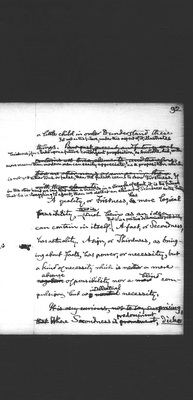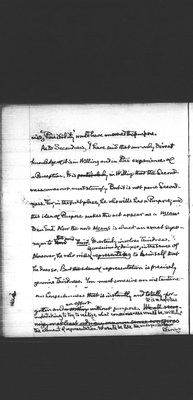Pages
61
a thing as the Secondness of Thirdness. But there is no Secondness of Pure Firstness and no Thirdness of Pure Firstness or Secondness. When you strive to get the purest conceptions you can of Firstness, Secondness, and Thirdness,— thinking of Quality, Reaction, and Mediation,— what you are striving to apprehend is Pure Firstness, the Firstness of Secondness,— that is what Secondness is, of itself,— and the Firstness of Thirdness. When you contrast the blind compulsion of in an Event of Reaction considered as something which happens and which of its nature can never happen again, since you cannot cross the same river twice, when, I say, you contrast this compulsion with the logical necessitation of a meaning considered
62
92
a little child in order to understand these things. But past, present and future each contains all three elements, and therefore, there are other ways of comparing them with these elements. Yet well as the future, under this aspect of it, illustrates Thirdness, if one looks upon a future contingent proposition, as Aristotle did, with more reason than modern men can easily appreciate, as a proposition which is not yet either true or false, then the future seems to show Firstness. If on the other hand we say that when a man is in a struggle of effort, it is the future that he is struggling to affect, then we detect an element of Secondness in the Future.
A quality, or Firstness, has mere logical possibility,— that is, such being as an idea can contain in itself. But it is a positive determinate possibility. a fact, or Secondness, has actuality. A sign, or Thirdness, as bringing about facts, has power, or necessity, but a kind of necessity which is neither a mere negation absence of possibility nor a blind compulsion, but an intellectual necessity.
It is very curious, not to say surprising, that Where Secondness is predominant, dichotomies
63
as something that has no being at all except so far as it actually gets embodied in an event of thought, and you regard this logical necessitation as a sort of actual compulsion, since the meaning must actually be embodied, what you are thinking of is a Secondness involved in Thirdness.
A Firstness is exemplified in every quality of a total feeling. It is perfectly simple and without parts; and everything has its quality. Thus the Tragedy of King Lear has its Firstness, its flavor sui generis. That wherein all such qualities agree is universal Firstness, the very being of Firstness. The word possibility fits it, except that possibility implies a relation to what exists, while universal Firstness is the mode of being of itself. That is why a new word was required for it. Otherwise,
64
94
or distinctions between two kinds prevail; and that might perhaps have been expected. But it is rather surprising that where the element of Thirdness is predominant, trichotomies, or the divisions into three kinds prevail. In saying this, I am speaking of divisions of form not mere divisions according to matter. The dichotomies of secondness all have a general likeness, the one species being more factual or compulsive external, the other more internal. The trichotomies of thirdness also have a general likeness, one species being decidedly intellectual and having trichotomic subdivisions, another more factual and having dichotomic subdivisions, and the third more qualitative, and these have [mere?] divisions according to matter. Thus, in what has the form of fact, Secondness is the predominant
65
“Possibility” would have answered the purpose.
As to Secondness, I have said that our only direct knowledge of it is in Willing and in the experience of a Perception. It is in Willing that the Secondness comes out most strongly. But it is not pure Secondness. For, in the first place, he who wills has a Purpose; and that idea of purpose makes the act appear as a Means to an end. Now the word Means is almost an exact synonym to the word third. It certainly involves Thirdness. Moreover, he who wills is conscious of doing so, in the sense of representing to himself that he does so. But the idea of representation is precisely genuine Thirdness. You must conceive an instantaneous Consciousness that is instantly and totally forgotten and an effort without purpose. We all recognize, or at least ordinary common sense conceives It is a hopeless undertaking to try to realize what consciousness would be without the element of representation. It would be like unexpectedly hearing




